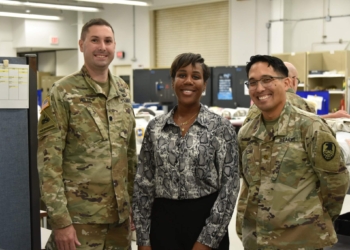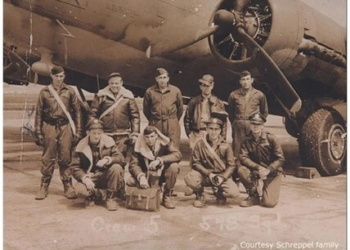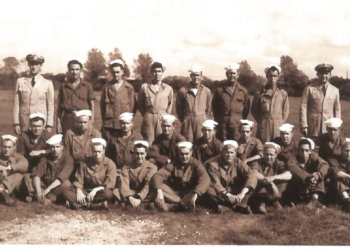The game of Clue and Rosie the Riveter don’t usually have anything in common, but today they do. Two veteran entrepreneurs each took a seed of an idea and turned them both into successful businesses.
Navy reservist and 16-year active duty veteran Ryan Hogan is the co-founder of Hunt A Killer, what he calls “an immersive story that’s told episodically through a physical delivery.” Ultimately, he and his business partner, Derrick Smith, took what the public wanted and gave it to them: a love of interactive role-playing, like escape rooms, and a need for monthly subscription boxes.
Jennifer Wakefield is the founder of Comrade Creative. When she left active duty Navy service and discovered a gap of veteran sisterhood, she aimed to fill it. The logo her company uses is an updated version of the World War II cultural icon.
“I just wanted to create a sisterhood of female veterans, that even after service we can still support each other,” Wakefield said. “We understand some of our same problems in transition, all while giving back to organizations that serve veterans, or if possible, specifically female veterans.”
Hogan and Wakefield’s success is, unfortunately, not the norm in America. During a panel discussion at the U.S. Chamber’s 75th Anniversary of the GI Bill, Hon. Patrick Murphy — the 32nd Under Secretary of the Army — spoke about how most veteran entrepreneurs have to be prepared to fail, because most small businesses do in their first year. On the upside, though, he added that veteran entrepreneurs tend to be more successful than civilians.
Overcome challenges

Hogan knows all about failure, too. He is a serial entrepreneur who has started many businesses. In fact, 99% of them have fallen short. Hunt A Killer has found traction for success, but that came after a prior business shut down right before his transition from active duty.
“The biggest thing is there was always a fallback. There was always support,” Hogan said about being an active duty entrepreneur. Now, he does not have the guarantee of the Navy to keep him, his four children and his wife fed with a roof over their head.
“The other side to that is there are no guarantees … balancing adult responsibilities, balancing family responsibilities and taking huge risks, that’s probably the biggest mental challenge here,” he said.
Wakefield had to use patience while her own business became established. While social media and word-of-mouth are beneficial tools to small business owners, the pace is not to be desired.
“It is hard to find a large audience of female veterans to get the information out to in a quick way,” she said.
Do what you’re best at
No matter the challenges, if people do what they love, the work becomes worthwhile. While Wakefield has a personal investment in uplifting specific niches within the veteran populace, Comrade Creatives is built upon a passion.
“I’ve had people that have been out for a decade or more, and they’re like, ‘For the first time I can support something that actually feels like it’s me.’ So that’s been amazing to actually give, ya know, proper recognition and representation to people that for so long didn’t have it,” she said.
By identifying a gap, Wakefield’s business venture, at the basis of it all, provided her with additional self-worth.
“So along with, ya know, sharing stories and building support around vets, being a peer support is something I really feel passionate about,” she said.
Hogan says his successes come from not only knowing what he is good at — finding product/market fit — but also identifying what others are good at.
“I think that there is this fallacy that lives where people think that they need to improve their weaknesses so they can be better in certain areas,” he said. “Well, that’s not how an entrepreneur should think. How an entrepreneur should think is if you have weaknesses, you should go find the best in the world at those things which will allow you to do what you are truly good at.”
At Hunt A Killer, Hogan and his partner have built a team of over 40 people from all over the world. Each of them, he says, add value to his company that allow him to focus on aspects that he is an expert at.
Know when to start

When transitioning out of service, some may find it hard to identify how work skills can translate. But one thing that has helped Hogan’s entrepreneurial track — because he says his current success isn’t a result of one business, but a succession of many, even the failed ones — is the military’s mindset of not knowing how to fail.
“You’re put through the stress test in the military constantly, and being able to translate a lot of that resiliency into business,” Hogan said. “I don’t think we talk about this often, or as often as we should, but the resiliency and being able to not understand failure, like, it gives us so much of an edge over 50, 60% of entrepreneurs out there who have no idea what they’re getting themselves into.”
The military’s structure and discipline has also helped Wakefield in operating her venture.
“You really have to be disciplined because there have been times, even for myself, that I had not anticipated, like, a rush of orders and it happened … always set time aside, because even if you don’t have orders to fulfill or something to complete, you can still use that time to promote or build some type of new item or network.”
Neither Wakefield nor Hogan would be where they are today without actually taking the initiative to start. Many people have ideas, some not always successful, but Hogan says people have to take the first step for there even to be a chance at success.
“The biggest impediment for people is breaking that mindset that, ‘I can actually do this. I have this idea and all I need to do is figure it out.’ And so we know how to not give up, we know how to not stop,” Hogan said. “But I think sometimes we fall short on where to start.”







































